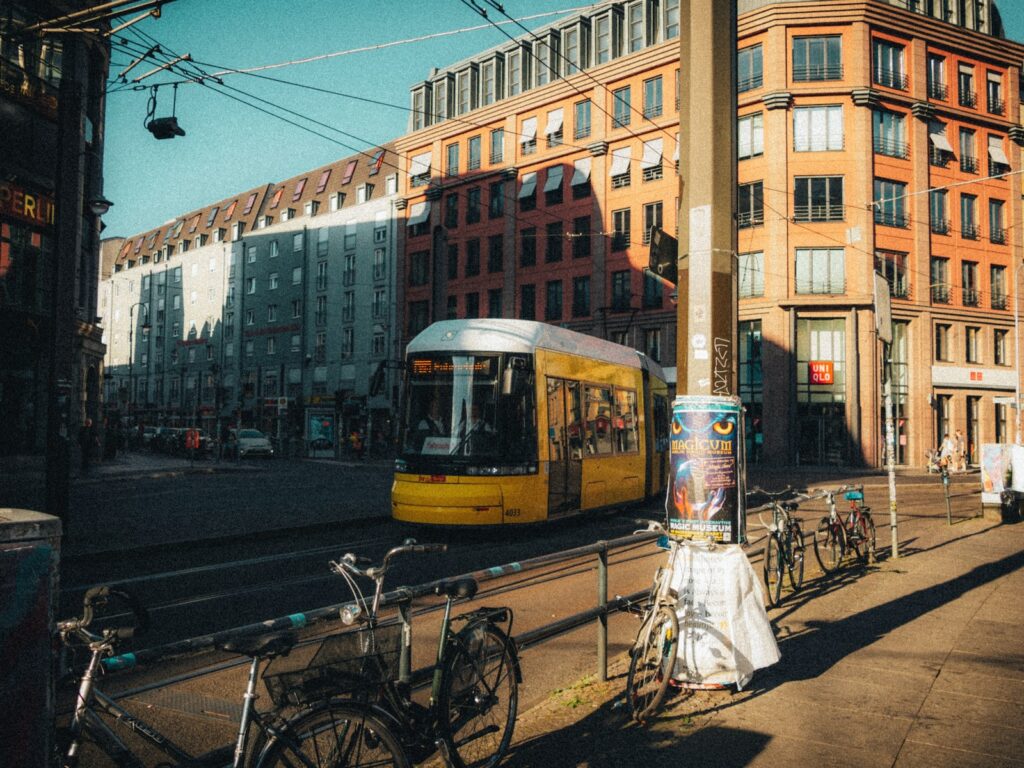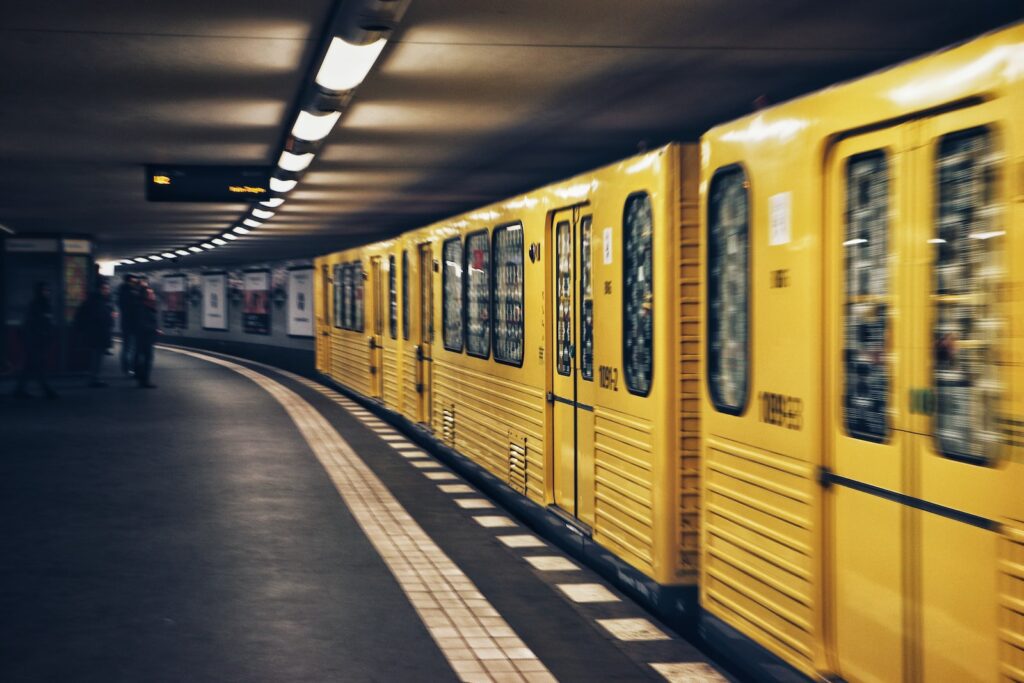Expats in Berlin: Everything You Need to Know
There are countless crowds of expats in Berlin—it’s a hugely popular place for seeking out a brand-new life, and the city is home to people from around 170 different nations.
One of the country’s most trendy, exciting and multicultural places, it’s cultural, quirky and cosmopolitan—and it’s among the best places to live in Germany.
But you might not know for sure if being an expat in Berlin is definitely for you… so in this guide, your good friends here at Homelike have brought you a big fat slice of currywurst-coated help!
Coming up, we’ve covered pros, cons, perks, prices, nightlife, neighborhoods, where to live in Berlin as an expat, and a whole load more fun and informative stuff.
Pondering upon whether you want to join the expats in Berlin? Ponder no longer—we’ve brought you everything you need to know!
Pros and cons of being an expat in Berlin
Pros of living in Berlin
- It’s one of the trendiest cities in the world: Berlin is endlessly trendy, with a whole bunch of cool people, fun hangouts, and interesting events. It’s impossible to get bored here, and you’ll always find something weird and wacky to do.
- Huge diversity: no matter where you’re from, you’ll find some of your own crowd already living in Berlin. It’s home to people from around the globe—so you’ll always be welcome, and you’ll always find a range of multicultural experiences to enjoy.
- For this part of the world, it’s surprisingly affordable: most western European and central European capital cities really aren’t affordable. And although we’re not gonna pretend that Berlin is cheap, it’s still a lot cheaper than most people expect.
- Excellent cycling infrastructure: if you like zooming around on two wheels, you’ll love expat life in Berlin. The city has over 620 miles (1,000km) of bike-friendly lanes and paths, and drivers are super-respectful towards cyclists.
- Public transport is great: both within the city, and throughout the nation, public transport is excellent. We’ve covered that soon in much more depth…!
- Lots of parks: Berlin is home to some of Germany’s nicest and most alluring city-center parks. Around half of the city is made up of green space… but—again!—we’ve covered that in much more detail soon.
- Public services: expat life in Berlin comes with excellent services and infrastructure. Healthcare and education are great, roads and buildings are well-maintained, and the streets are clean, tidy, and safe.

Cons of living in Berlin:
- It can be irritatingly leftfield: if you love the hipster life, you’ll also love Berlin. But if you find that stuff all a bit contrived and tiresome, you’ll probably find Berlin (or at least certain pockets of Berlin) pretty annoying.
- It’s very difficult to find a place to live: Berlin is notoriously bad for finding a home, with hundreds of people often applying for one residential vacancy (and that’s no exaggeration). It’s usually way easier to find a serviced apartment or serviced flat.
- Lots of busy bustle: Berlin is crowded, especially in the most central neighborhoods. You can partially avoid this by living on the outskirts—but any time you’re in the city, expect to be surrounded by countless packs of people.
- Cold winters: Berlin’s winters can be very cold and bleak. In the heart of winter, the average low temperatures can often sit at around -2° or less.
- Many things are closed on Sundays: many supermarkets and pharmacies are closed on Sundays, which is an oddly old-fashioned aspect of life here.
- Boring bureaucracy: German authorities love the banalities of bureaucracy, so your move here won’t be hassle-free. Expect to sign a seemingly-infinite number of forms, and stand in constant queues.
- Taxes are super high: for lots of newcomers, this is one of the most surprising aspects of expat life in Berlin. Some of the highest-earning individuals need to pay a whopping 45% tax.
Public transport in Berlin
Berlin’s public transport is so good that the overwhelming majority of the city’s dwellers get around without a car—Berlin is home to approximately only one car per three residents! Wherever you want to go, you can pretty much always get there with public transport, which (broadly speaking) comes in five various forms:
S-Bahn (traditional overground trains), U-Bahn (underground trains, though some also run overground), trams, buses, and ferries (though most Berlin residents take ferries very rarely).
Using this public transport system is quick, stress-free, and easy to understand. You simply buy a ticket according to the zone you’re traveling within (there are three separate zones). Your ticket is then valid on any and all forms of local public transport, for a period of two hours. Simple!
If you frequently use public transport, it’s also possible to buy a weekly, yearly, or monthly ticket. And it’s pretty affordable—a monthly three-zone pass costs only €107.
As we’ve already mentioned, Berlin is also a massively cycle-friendly city. If you want to zip around exclusively by bike, you won’t find many better cities than this. Just make sure you know these rules for cycling in Germany before hopping on that bike.
Best of all, Berlin has lots of excellent public transport schemes. If you have a long-term ticket, you can sometimes bring a friend with you for free… and it’s also often possible to ride with dogs and bikes.

Opening a bank account for expats in Berlin
Before you can open a bank account in Berlin, you’ll usually need your all-important anmeldung* (which is basically just an official acknowledgement that you’ve formally registered your address).
*But here’s where things get tricky—you need an address to get an anmeldung. And you need an apartment to get an address… but it can sometimes be difficult to get an apartment without a bank account (which is why it’s often easier to find a serviced apartment or a serviced flat, to reroute around any of this trouble).
Anyway, once you have your anmeldung, you’ll also need your passport, and often a residence permit (unless you’ve moved from within the EU, in which case you won’t need one) to open a bank account. Some of the best and most well-known German banks include bunq, N26 (both of which are online-only and easy to use), Commerzbank, and Deutsche Bank.
All of that said, some banks don’t require you to have an anmeldung, which can be a convenient solution to your tricky little problem. Here are some of them.
In addition to the regular current account, if you’re a non-EU citizen student, you may have to open a blocked account (Sperrkonto) in order to fulfil the financial requirements for a residence permit in Germany.
A blocked account is a special bank account in which you deposit a certain amount of money to cover your living expenses in Germany. The account is “blocked” in the sense that you cannot withdraw the money until you receive your visa or residence permit for Germany from the German authorities. You can also open a blocked account with a bank in Germany or with a provider such as Fintiba.
In summary, a regular current account is suitable for everyday financial needs, while a blocked account is a mandatory requirement for a residence permit application. If you need to open a German bank account, consider using a provider such as Fintiba, which offers a range of services and competitive rates for non-EU citizens.
Best neighborhoods to live for expats in Berlin—where to live in Berlin as an expat
There are a huge number of varied neighborhoods in Berlin, with endless different atmospheres. But to get you started, here are some of our favorite options for where to live in Berlin as an expat…
- Mitte: the very center of the center, Mitte is the best option if you want to be in the heart of all the action. It’s home to loads of Berlin’s attractions, and it’s a mega-popular choice for young professionals, and people who have some money to spare.
- Friedrichshain: a great compromise between upmarket and edgy, Friedrichshain is somehow both chaotic and classy. Here, you’ll find brilliant nightlife, upmarket apartments, excellent coworking spaces, and some nice parks and cafes.
- Kreuzberg: Berlin is known for being a hipster haven. But of all the city’s districts, this is the most hipster of them all. Crammed with bonkers bohemians, unusual venues, and a bunch of avocado-based brunches, it’s one of the trendiest neighborhoods on the planet.
- Spandau: alright, this neighborhood isn’t going to win any ‘world’s most exciting district’ awards. But it’s vast, green, and spacious, and it’s packed with family homes. If you’re seeking a quiet life, Spandau is an excellent option.
- Charlottenburg-Wilmersdorf: if you want to live centrally without being perpetually surrounded by nightlife, Charlottenburg-Wilmersdorf is an excellent choice. Expensive, upmarket and relatively quiet, it’s popular with families and middle-class professionals.
- For much more information on all these districts and more, check out our guide to the 12 best neighborhoods to live for expats in Berlin.
Best areas for restaurants and bars in Berlin
You can find endless eats and treats in basically all parts of central Berlin (and many parts of not-so-central Berlin). But some of the top choices include.
- Neukölln: sort of like a mini Kreuzberg, Neukölln is hip, happening and arty. You can find a whole variety of bars here… and because it’s also a very multicultural area, it’s great for finding global eats and treats (especially Middle-Eastern fayre).
- Mitte: because Mitte’s the most central part of Berlin, it’s of course great for finding endless meals and morsels to munch on. To get started with your foodie funfest, check out Curry Mitte, Lebensmittel Mitte, District Mot, and Salamat.
- Schöneberg: this southwestern district borders the city’s edgy areas, but it’s a little more upmarket and elegant. It therefore offers a nice balance of bistros, bars, fancy joints, and fusion food.
- Charlottenburg-Wilmersdorf: for a classier slice of expat life in Berlin, head here. You’ll find high-end eateries, pricey cocktail bars, and some much-welcome laconic luxury. Elegant MontRaw is one of the district’s top spots.

Best areas for Berlin nightlife
Some of the city’s top nightlife districts include:
- Friedrichshain: although Friedrichshain isn’t quite as edgy or iconic as some of its neighbors, it’s home to world-famous Berghain (good luck getting in), underrated Cassiopeia, and some other excellent clubs and bars.
- Kreuzberg: the most famous-for-nightlife district in all of Berlin, Kreuzberg is stuffed with trendy places to dance and drink. Some of the top spots include Tresor (perhaps the best nightclub in Berlin), Wild at Heart, and canal-based Club der Visionäre.
- Winterfeldtplatz: the LGBTIQ+ epicenter of the city, Winterfeldtplatz liberally flies the rainbow flag with pride. You’ll find a huge range of nightlife options here, along with the city’s excellent and iconic annual Pride festival.
Best parks in Berlin
Berlin has a hefty number of beautiful, elegant and exciting green spaces. Some of the best include:
- Tempelhofer Feld: this massive space measures in at a sprawling 890 acres. Once a huge airfield, the place ceased operation in 2008—and it’s been brimming with cyclists, skaters, picnickers and partygoers ever since. It even has an urban gardening area!
- Viktoriapark: one of Berlin’s least bohemian parks, Viktoriapark is popular with families, book-readers, romantic-strolling couples, and anyone who’s looking for a laid-back city retreat. It’s home to a waterfall, a vineyard, and plenty more.
- Tiergarten: the most central park in Berlin, the Tiergarten lies right beside both Brandenburg Gate and the Victory Column. Inside the place, you’ll find the city’s zoo, and much more fun.
Expat forums in Berlin, and expat groups in Berlin
Expat life in Berlin (like expat life anywhere!) will of course be better if you make some friends. Luckily, you’ll find a huge number of online resources for locating loads of brand-new buddies.
A good place to start is by searching Facebook, using terms like ‘expat groups Berlin’ and ‘expat forum Berlin.’ Here, you’ll be able to find other newcomers, friend-searchers, and people who have the same interests and hobbies as you. Here’s one international group to get you started, but you’ll find heaps more.
Because Berlin is so populated, diverse and trendy, you’ll always find someone who shares whatever passions you have. Whether you’re into running, weightlifting, sewing, independent movies, extreme ironing, or something even stranger, you’ll find people doing it in Berlin.
Couchsurfing is also a great resource for hunting down new amigos, especially in a new city. Here, you can find long-term residents, short-term stayers, and lots of varied events.
But don’t worry—you’ll easily be able to find your clan in Berlin. If you can’t make friends here, you can’t make friends anywhere.
Finding a place to live for expats in Berlin
This is usually the most annoying part of moving to Berlin. Most expats in Berlin find themselves frustrated because there are so many other accommodation-seeking newcomers desperately scrambling around to find a place to live.
Often, a newly-available apartment can have literally hundreds of people applying (and outbidding one another) to live there.
It’s therefore often easier to instead find a serviced flat or serviced apartment in Berlin. It’ll make your expat life in Berlin much easier, and your transition much more simple and smooth. If that sounds like a helpful solution, We have lots of affordable, convenient and homely apartments available in Berlin now—they’re all fully-furnished and ready to move into right away.
If you want to look for long term rentals straight away, we have some great options on our website. All our apartments are furnished and don’t generally require a Schufa score. Other resources include, Immobilien Scout and Immowelt. On these sites, you can find places to live alone, and flatshares where you can move into a spare room.
Of course, Facebook is also a good option. This group alone has more than 100,000 members… and there are many more groups for finding various places to live in the city.
For much more information, here are our 6 favorite hacks for finding an apartment in Berlin..
Finding a job for expats in Berlin
Because Berlin is such a bustling city, it’s a pretty good place for finding a job. Competition can admittedly be high, but you can always find plenty of vacancies, both for high-level and entry-level roles.
If you’re moving from within the EU, you can find a job after you arrive. But if you’re moving from outside of the EU, you’ll usually need to secure a job before you land in the city.
For embarking on your job hunt, two of the best resources are Monster and Indeed. If you’re specifically looking for an English-speaking job, you should start your search at Englishjobs.de.
For much more information, here’s our bumper guide on finding a job in Germany.
Cost of living in Berlin
When you move to Berlin, here are the types of costs you can expect to find:
- 1-bedroom apartment in the city center: €1,223
- 1-bedroom apartment outside of the city center: €897
- 3-bedroom apartment in the city center: €2,203
- 3-bedroom apartment outside of the city center: €1,639
- One-way ticket on local public transport: €3
- Regular monthly pass for local public transport: €107
- Meal for 1 at an inexpensive restaurant: €12
- 3-course meal for 2 people at a mid-range restaurant: €60
- Large draught domestic beer in a bar or restaurant: €4
- Regular cappuccino in a cafe or restaurant: €3.20
- 0.33-liter Coke or Pepsi in a cafe or restaurant: €2.40
- Regular liter of milk from a supermarket: €1.05
- Loaf of white bread from a supermarket: €1.52
- 12 regular eggs from a supermarket: €2.75
- 1kg of local cheese from a supermarket: €12.30
- 1kg of chicken breast filets from a supermarket: €9
All of the above prices have been taken from the most recent stats at good ol’ trusty Numbeo.
Expats in Berlin: Final Thoughts
That’s everything you need to know about expat life in Berlin!
For much more more information, here’s everything you need to know about moving to Berlin, and everything you need to know about living in Germany (no matter which city you’re moving to!).
Again, if you want to make your move as stress-free and simple as possible (especially in the short-term), we have a huge number of excellent serviced apartments and serviced flats in the city. They’re all comfortable, cozy, and fully-furnished, and you can move into them today.
Thanks for reading!






















